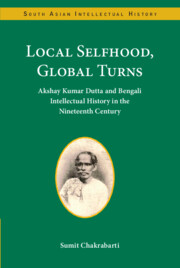 Local Selfhood, Global Turns
Local Selfhood, Global Turns Book contents
- Frontmatter
- Dedication
- Contents
- Acknowledgements
- Note on Transliteration
- Introduction
- 1 The Discontents of Eclecticism: The Milieu of Akshay Kumar Dutta
- 2 The New World of Science: Akshay Kumar Dutta as the ‘Science Worker’
- 3 The Tattwabodhini Period: The Conflicting Contours of Self-Fashioning or Towards a Global History?
- 4 Reconstructing Bengali Selfhood: The Conception of Dharma in Akshay and Bankim
- 5 On the Question of the Public Sphere: Civic Life, Polity, Dissent, and an Affective Engagement with the Janasamaj
- 6 Imagining Bharatvarsha: Identity, History, Nationhood
- Conclusion and Further Thoughts
- Bibliography
- Index
2 - The New World of Science: Akshay Kumar Dutta as the ‘Science Worker’
Published online by Cambridge University Press: 30 June 2023
- Frontmatter
- Dedication
- Contents
- Acknowledgements
- Note on Transliteration
- Introduction
- 1 The Discontents of Eclecticism: The Milieu of Akshay Kumar Dutta
- 2 The New World of Science: Akshay Kumar Dutta as the ‘Science Worker’
- 3 The Tattwabodhini Period: The Conflicting Contours of Self-Fashioning or Towards a Global History?
- 4 Reconstructing Bengali Selfhood: The Conception of Dharma in Akshay and Bankim
- 5 On the Question of the Public Sphere: Civic Life, Polity, Dissent, and an Affective Engagement with the Janasamaj
- 6 Imagining Bharatvarsha: Identity, History, Nationhood
- Conclusion and Further Thoughts
- Bibliography
- Index
Summary
In this chapter I plan to read and understand, in a global framework, the scientific milieu that shaped the mind of Akshay Kumar Dutta. As a companion piece to the previous chapter, the present one will help to consolidate the epistemological framework within which the intellectual world of Akshay may be located and read. It will not be off the mark to refer once again to the letter that Rammohun wrote to Lord Amherst in 1823 emphasizing the need for science education in the form of mathematics, natural philosophy, chemistry, anatomy ‘with other useful sciences which may be accomplished … by employing a few gentlemen of talents and learning, education in Europe and providing a college furnished with necessary books, instruments, and other apparatus’. This letter could be read as symptomatic of the intellectual climate of Calcutta during the early decades of the nineteenth century. Not due to the consequence of this letter, but due to imperatives of history and their complex colonial manifestations, there was a radical epistemological movement, particularly in the field of the sciences, during the nineteenth century in India. This change or shift was procedurally complex, and the consequences were far-reaching in terms of their impact on the intellectual history of both India as an emerging nation and Bengal as its epicentre. There is little scope here of a sweeping judgement, and generalities need to be carefully interrogated before they may be assigned axiomatic veracity. No wonder, there were major scientific and technological developments during this time in India, and things were happening at a considerably fast pace. Largely, there was a Eurocentric thrust to this development, and with it an obvious and subsuming narrative of colonialism, and the emancipatory logic of modernity. Western-educated natives, conversant with the English language, were often a part of an almost pervasive project of scientific and technological modernity. Also, such a project had complex manifestations within the different disciplinary tributaries of scientific and technological practice, and the participation of the colonized subject was not always homogeneous and consistent within this veritable melting pot of scientific advancement or the narrative of progress.
- Type
- Chapter
- Information
- Local Selfhood, Global TurnsAkshay Kumar Dutta and Bengali Intellectual History in the Nineteenth Century, pp. 52 - 88Publisher: Cambridge University PressPrint publication year: 2024
